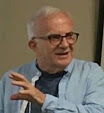I still remember the smells of sweat and sawdust. In my West Virginia hometown the whole community came out when traveling evangelists brought their road shows to town. We worshiped in churches, at the park, or in tents outside of town. We worshiped with singing and shouting, with laughter and tears. No one watched the clock when we got together. No one could imagine a better place to be. What our religion lacked in sophistication we made up for with joyful exuberance.
 But as I grew older this was not enough. I had too many questions, and my persistence in asking them made my elders uneasy. These 'revivals' were designed not to open my mind or expand my heart but to save my soul from the eternal fires of hell. I believe that my childhood religion was deeply rooted in a genuine faith, but it was too narrowly conceived to sustain the journey of a lifetime.
But as I grew older this was not enough. I had too many questions, and my persistence in asking them made my elders uneasy. These 'revivals' were designed not to open my mind or expand my heart but to save my soul from the eternal fires of hell. I believe that my childhood religion was deeply rooted in a genuine faith, but it was too narrowly conceived to sustain the journey of a lifetime.
 But as I grew older this was not enough. I had too many questions, and my persistence in asking them made my elders uneasy. These 'revivals' were designed not to open my mind or expand my heart but to save my soul from the eternal fires of hell. I believe that my childhood religion was deeply rooted in a genuine faith, but it was too narrowly conceived to sustain the journey of a lifetime.
But as I grew older this was not enough. I had too many questions, and my persistence in asking them made my elders uneasy. These 'revivals' were designed not to open my mind or expand my heart but to save my soul from the eternal fires of hell. I believe that my childhood religion was deeply rooted in a genuine faith, but it was too narrowly conceived to sustain the journey of a lifetime.While I was quite young, and for reasons I still do not understand fully, I walked to a drugstore across town and purchased a recorded symphony. I could not even pronounce the composer’s name: Tchaikovsky. The symphony was his Pathetique. Closeted in my bedroom, I played it over and over on my sister's Decca phonograph. At first it made little sense to me, but soon I began to hear tunes, themes and particular instruments. The more intently I listened, the more the music revealed itself to me. It had come from another world, and it beckoned me beyond the boundaries of my life as I had known it until then.
This invitation to cross some unspecified boundary has become a frequent and welcomed visitor in the intervening years. I heard it again in a loon’s call in northern Minnesota, in the plaintive horn of Louis Armstrong, and in the violent rush of spring waters down a New Hampshire mountainside. While walking alone amidst the ruins of Olympia, or preaching in an old Welsh chapel in Swansea, or walking with my children in the Badlands of South Dakota, I felt, like Jacob at Bethel, that “surely God is in this place.”
When dancers moved across the stage in a darkened Princeton theater, when an unknown woman played Brahms in a dimly lighted room in St. Galen, or when a single soprano heralded the Easter dawn in a crowed Siberian cathedral, I knew that I was part of a larger reality. Even in the dirty confines of a migrant laborers’ camp, or an NAACP-sponsored summer job corps office in Trenton, N. J., or by the bedside of a dying friend, I did not escape God’s presence. “Deep calls unto deep. At night, God’s song is with me.”
When dancers moved across the stage in a darkened Princeton theater, when an unknown woman played Brahms in a dimly lighted room in St. Galen, or when a single soprano heralded the Easter dawn in a crowed Siberian cathedral, I knew that I was part of a larger reality. Even in the dirty confines of a migrant laborers’ camp, or an NAACP-sponsored summer job corps office in Trenton, N. J., or by the bedside of a dying friend, I did not escape God’s presence. “Deep calls unto deep. At night, God’s song is with me.”
Much contemporary religion fails to do justice to the grandeur of God and the ambiguity of the human situation. Too often theology is reduced to clichés and mindless confessions. Religious communities are manipulated as mere political constituencies. A reverence for deeper things - what Aeschylus called “the monarchy of awe” - has disappeared nearly altogether. Yet awe veils a mystery, and from this mystery comes a summons. Humbling ourselves, we hear it. Opening ourselves, we find answers to questions we didn't know resided in our hearts.
(Badlands view from Norbeck Pass. NPS Photo by Shaina Niehans)













Oh yeah...and still looking for answers,sometimes not even sure what the questions are.
ReplyDelete